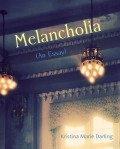 Melancholia (An Essay). Ravenna Press, 2012. Available here.
Melancholia (An Essay). Ravenna Press, 2012. Available here.
*Nominated for the PEN/Diamonstein-Spielvogel Award for the Art of the Essay*
Praise for Melancholia (An Essay):
The experience of reading this essay is like being an explorer and discovering a love story-in-poems in a land where poems are memories. Darling’s meditations arrive as letters, definitions, lists, missing text with footnotes, and glossaries. Melancholia touched and moved me with its delicacy, and thrilled me with its subversions. A lovely, tender book.
—Molly Gaudry, author of We Take Me Apart
Fragmentary and talismanic, the poems in Kristina Marie Darling’s Melancholia (An Essay) chart the arc of abjection after the loss of a beloved as the author slyly deconstructs the stuff of nineteenth century courtship rituals. Darling’s collection is filled with fractured love tokens—a shattered glass jewelry box, a necklace’s broken lobster clasp, a brass locket with an empty frame—as well as fragmented forms: self-conscious footnotes, definitions, and glossaries of terms. These elliptical poems, obsessive and oblique, gleam from the dark world of Darling’s noctuary—that “record of what passes in the night.”
—Anna Journey, author of If Birds Gather Your Hair for Nesting
Trembling with shine, Melancholia is a new jewel in the continuing assemblage of sparse and bright words from Kristina Marie Darling. This book sparkles with lonesome fragments and open space, with the quiet bruises of falling apart.
—J. A. Tyler, author of In Love With a Ghost
Melancholia (an Essay) is a beautiful composition in which Ms. Darling takes us on a journey into the topography of her heroine’s melancholia. She juxtaposes text with footnotes, interlaces quiet, melodious language with momentous silence and, in the process, transforms the way we appreciate poetry.
—Brigitte Byrd, author of Fence Above the Sea
Think Maurice Blanchot asleep and dreaming of dictionary after dictionary washing ashore, half-drowned and thick, wordish, sputtering water, and thankful for air. Darling makes what is at the heart of our matter, mutter, muster go stunningly missing.
—Sabrina Orah Mark, author of The Babies
Kristina Marie Darling’s mesmerizing Melancholia: An Essay is a velvet-lined jewelry box and an echo chamber, where voice mutes into white-space absence, footnotes point to elided referents, and glossaries leak incomplete history. “Melancholia,” she reminds us, means “to play a familiar piece of music.” Darling deftly quiets those tropes—those vestiges of the tropes of desire—that have historically silenced the beloved, the object; she fiercely harbors the voice of the beloved while the manor burns down. She whispers to us from the smoldering ruins, under the aegis of “drowsy numbness,” of nightingales singing to sleepwalkers.
—Richard Greenfield, author of A Carnage in the Lovetrees
Reviews of Melancholia (An Essay):
“Kristina Marie Darling is becoming one of the foremost practitioners of the little book, of the poetic text as miniature object, as a kind of fragmented memento charged with mystery.”—Big Other.
“Darling continually creates and erases a world unlike any other in contemporary poetics… Every object seems to glow with the most unnatural lights and each word seems to refract an image more beautiful than the last…A strange and ethereal little book, Melancholia quietly turns technical texts into poem-like fragments with a practiced subtly so haunting and dreamily erotic, you’re left convinced that the poet’s ‘beloved’ could be behind you, watching as you read.”—Gadfly Magazine.
“Kristina Marie Darling’s Melancholia (An Essay) is an unraveling – through science, history, nature – of loss and the residue of loss…Darling enthusiasts know her by now as a great maker of lists, hidden texts, reflective footnotes to poems or dreams of poems and other works – and she does her best work in this medium, in this obsessive interplay of what constructs or is left unsaid within a poem or memory.”—Planets, Heavy Bodies.
“Darling tells a love story through fragments, definitions, glossaries, and footnotes. She uses these elements to bring forth the absence of the ‘essay’…I absolutely love this method of presence-via-absence.”—The Stanza: A Little Room for Poetry & The Writing Life.
“Darling uses fragmentation to force the reader to engage in the making of the text. Fragmentation, which may have reached its height in the poetry of the modern period, has a history in the Romantic period as well. These poets had access to classicism through its ruins only—the bits and pieces of a bygone but also longed-for era. It is the same interesting marriage of longing and loss that Darling captures in these poems and without ever giving in to our desire to know the whole story.”—The Rumpus.
“Kristina Marie Darling has created a true gem of a poetry collection with Melancholia (An Essay). Reminiscent of Anne Carson’s use of language and interpretation in Decreation and Natasha Trethewey’s narrative arc in Bellocq’s Ophelia, Darling utilizes language and imagery to create a flowing story told through poetry.”—Heavy Feather Review.
“Recommended. On my third time through, it continues to creates wonder.”—John Burgess, author of A History of Guns in the Family.
“Darling compiles an unusual collection and a striking narrative in her essayistic assemblage, Melancholia….There is a certain vivaciousness in this collection that builds excitement just as much as it conveys melancholy.”—iO: A Journal of New American Poetry.
“Kristina Marie Darling’s Melancholia is a beautiful work full of dreams, memories and elegance. The nature of the language is almost felt rather than spoken. We do not even necessarily read it as we turn the pages, we absorb it….we hasten after it.”—Tuck Magazine.
“Darling’s collections—composed of fragments, definitions, and footnotes—embody a fearless use of white space and a devotion to unfinished narratives that reach the reader like secretive whispers only partially heard…I would have never written these poems because I am too unsettled by the cracks in things; I’m always trying to tenderly create a whole landscape in my work, and large amounts of white space give me more fear and anxiety than they do pleasure. In short, I’m not brave enough to take the risks that Darling takes, and this courage is precisely what makes reading her work so dizzying and dazzling.”—Rattle: Poetry for the 21st Century.
“The details are given to us mostly in the form of footnotes and definitions, the kinds of things most writers overlook and whose anthology editors add so that the reader can have a better sense of what is going on. It is an unconventional choice to develop a narrative this way, but one that Darling employs with playful mastery. She seems to know just what pieces to keep and what to cut out so that we can enter this world and make sense of the details on our own terms.”—Gently Read Literature.
“Kristina Marie Darling is back in full force with another surreal and romantic collection titled Melancholia (An Essay) in which dreamy unaddressed, fractured letters and whimsical footnotes spin through the pages into a journey that makes you wish you could fall asleep and dream about the unnamed characters within its pages so you might finally see their faces and know their magic at closer range.”—Poet Hound.
“Kristina Marie Darling is one of our strongest young writers. Strong in the sense a magician is strong: not a master of stage tricks, but a worker of subtle miracles.”—Decomp Magazine.
“After passion, what is left? A jewelry box, a locket, a silver button, the silences between these objects. Each of these items sings to one another and it is this chorus that unifies Kristina Marie Darling’s haunted and haunting collection, Melancholia.”-The Nervous Breakdown.
“My first impression of gisting Melancholia was that of an elaborate game, played out using academic protocols of footnotes as a primary formal device. Flann O’Brien immediately comes to mind, but I was also reminded of the puzzling, shifting, landscape-drenched variations of Peter Greenaway’s gorgeous yet elusively stylised movie The Draughtsman’s Contract. I was also ‘memory-jogged’, less obviously perhaps, by some of Max Ernst’s nightmare dream constructions. The point being that there is a sophisticated and playful element to these ‘poems’ which centres around dictionary definition and high art. The title hints at a mood which denotes both luxury and loss and the function of memory in relation to a fin de siecle aesthetic.”-Stride Magazine.
“Like the objects described within the poems, the book itself seems like a small, precious thing.”-Pank Magazine.
“Darling weaves together a fine narrative written between the lines of the histories, glossaries, and definitions. The imagery and symbolism is detailed and the collection as a whole rich with meaning, rewarding multiple readings.”-Prick of the Spindle.
“Lovely.”—Bookslut.
Interviews about Melancholia (An Essay):
iO: A Journal of New American Poetry
Additional Features:
The Doctor T.J. Eckleburg Review
Excerpts:
